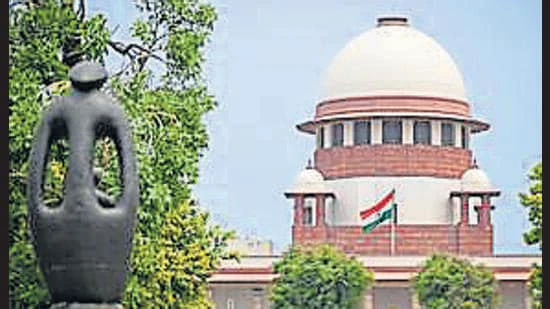The Union government on Thursday told the Supreme Court that state governments have no right to approach the top court alleging breach of fundamental or legal rights over delays or withholding of assent to bills by the President or governors, even as the Constitution bench asked whether it could ignore the intent of the framers who deliberately used the words “as soon as possible” in the Constitution to ensure timely action on bills passed by state legislatures.
Appearing before a five-judge bench led by Chief Justice of India Bhushan R Gavai, solicitor general (SG) Tushar Mehta submitted that neither the states nor the Centre can approach the top court under Article 32, since fundamental rights are conferred only on citizens and persons, not on governments.
“A state does not have fundamental rights. It is the repository of functions to protect citizens’ rights, but it cannot come to this court alleging its own rights have been infringed,” argued Mehta, stressing that Article 361 provides “complete immunity” to the President and governors from being questioned in courts for acts performed in discharge of their constitutional duties, including decisions on assent.
The bench, also comprising justices Surya Kant, Vikram Nath, PS Narasimha and Atul S Chandurkar, pressed the SG on whether constitutional authorities could indefinitely delay decisions on bills. “When the governor sits on a bill passed by the legislature even for the second time, can he sit on it for time immemorial?” the court asked.
Referring to the Constituent Assembly debates, the bench said: “It was first contemplated that there would be a six-week limit, but later it was decided that fixing a timeline was not appropriate. The words used were ‘as soon as possible’. One of the members said it should be ‘at the earliest’. Therefore, the expectation was that the governor would act with a sense of exigency. Can we ignore them?”
At one point, the bench warned that accepting the Centre’s reading could render the phrase “as soon as possible” otiose if governors could withhold assent “for eternity.”
The Centre’s submission was made during the hearing of President Droupadi Murmu’s Article 143 reference in May, which seeks clarity on the top court’s April 8 ruling laying down timelines for governors and the President to act on pending state bills.
The SG told the bench: “This has to be answered, else the questions will keep arising. Court cannot say, ‘Mr President decide in three months, and if not, give reasons’, and then tell the state, ‘if not, come to us’. Article 32 does not lie. It is not justiciable and mandamus cannot be issued.”
The Union’s submissions, placed before the bench, elaborated that Article 32 is “a remedial provision meant for the enforcement of fundamental rights under Part III,” but since a state itself is “the State”, it cannot maintain a petition alleging violation of rights that it does not possess.
“Permitting States to file Article 32 petitions would amount to turning the scheme of Part III on its head,” the submission read, adding that disputes between the Union and states are to be resolved under Article 131, not through the enforcement provisions of fundamental rights.
The Centre further underlined that neither under Article 32 nor Article 226 (writ jurisdictions) can constitutional courts issue a mandamus to the President or governors in the matter of assent.
“The decisions to assent, withhold, return with a message, or reserve a bill form part of the legislative process entrusted to constitutional heads… When these immunities are read with the nature of assent as a component of the legislative process, the result is non-justiciability in remedial terms,” said Mehta, relying on Article 361.
But the bench suggested that inordinate inaction could invite judicial scrutiny. “If not immediately, (the governor) has to respond within a reasonable time. Would the court not be justified to go into the circumstances and justifiability of sitting over a bill for six months or one year?” the bench asked.
Responding, Mehta emphasised that while circumstances might give justification for courts to intervene, there is no jurisdiction to interfere in such matters, adding that they are so closely linked with high policy or political discretion, the courts would consider them non-justiciable as it may require choices for which there exists no clear legal standards.
However, senior advocate Abhishek Manu Singhvi, representing Tamil Nadu, supported judicial review of gubernatorial inaction, contending that governors are “titular heads” bound by the aid and advice of the council of ministers, with only limited exceptions.
“Withholding must lead to returning. You can return only when you withhold… Permanent withholding will make mockery of the whole proviso,” said Singhvi, warning that to allow otherwise would be to create a “super chief minister” out of the governor.
Responding to a query from the bench about bills that may impinge on constitutional provisions, Singhvi said the governor has “no option” but to follow ministerial advice: “If a bill is unconstitutional, it will be struck down by courts. But the governor cannot usurp the judicial function.”
Singhvi also asked whether the Constitution anywhere states that the last word on a bill would be of the Governor and not of an elected government. According to the senior counsel, the pertinent constitutional provision contemplates a cycle of assent or return. To read it otherwise, he added, is to make the governor superior to the legislature and executive, something the Constitution never intended.
The arguments will continue next week.
The presidential reference, prompted by the court’s April judgment in the Tamil Nadu case, asks whether the judiciary can impose timelines on constitutional authorities like governors and the president when the Constitution itself is silent. In that ruling, a two-judge bench also fixed a three-month deadline for the president to decide on bills referred by a governor, and one month for a governor to act on re-enacted bills. It had even invoked Article 142 to deem 10 Tamil Nadu bills as assented to, after holding that the governor’s prolonged inaction was “illegal”.
